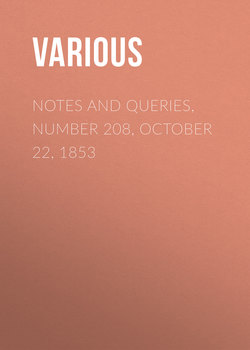Читать книгу Notes and Queries, Number 208, October 22, 1853 - Various - Страница 2
Notes
FOLK LORE
ОглавлениеFolk Lore in Cambridgeshire.—About twenty years ago, at Hildersham, there was a custom of ringing the church bell at five o'clock in the leasing season. The cottagers then repaired to the fields to glean; but none went out before the bell was rung. The bell tolled again in the evening as a signal for all to return home. I would add a Query, Is this custom continued; and is it to be met with in any other place?
F. M. Middleton.
New Brunswick Folk Lore:—Common Notions respecting Teeth.—Among the lower orders and negroes, and also among young children of respectable parents (who have probably derived the notion from contact with the others as nurses or servants), it is here very commonly held that when a tooth is drawn, if you refrain from thrusting the tongue in the cavity, the second tooth will be golden. Does this idea prevail in England?
Superstition respecting Bridges.—Many years ago my grandfather had quite a household of blacks, some of whom were slaves and some free. Being bred in his family, a large portion of my early days was thus passed among them, and I have often reverted to the weird superstitions with which they froze themselves and alarmed me. Most of these had allusion to the devil: scarcely one of them that I now recollect but referred to him. Among others they firmly held that when the clock struck twelve at midnight, the devil and a select company of his inferiors regularly came upon that part of the bridge called "the draw," and danced a hornpipe there. So firmly did they hold to this belief, that no threat nor persuasion could induce the stoutest-hearted of them to cross the fatal draw after ten o'clock at night. This belief is quite contrary to that which prevails in Scotland, according to which, Robin Burns being my authority, "neither witches nor any evil spirits have power to follow a poor wight any farther than the middle of the next running stream."1
C. D. D.
New Brunswick, New Jersey.
North Lincolnshire Folk Lore.—Here follow some shreds of folk lore which I have not seen as yet in "N. & Q." They all belong to North Lincolnshire.
1. Death sign. If a swarm of bees alight on a dead tree, or on the dead bough of a living tree, there will be a death in the family of the owner during the year.
2. If you do not throw salt into the fire before you begin to churn, the butter will not come.
3. If eggs are brought over running water they will have no chicks in them.
4. It is unlucky to bring eggs into the house after sunset.
5. If you wear a snake's skin round your head you will never have the headache.
6. Persons called Agnes always go mad.
7. A person who is born on Christmas Day will be able to see spirits.
8. Never burn egg-shells; if you do, the hens cease to lay.
9. If a pigeon is seen sitting in a tree, or comes into the house, or from being wild suddenly becomes tame, it is a sign of death.
10. When you see a magpie you should cross yourself; if you do not you will be unlucky.
Edward Peacock.
Bottesford Moors.
Portuguese Folk Lore.—
"The borderer whispered in my ear that he was one of the dreadful Lobishomens, a devoted race, held in mingled horror and commiseration, and never mentioned without by the Portuguese peasantry. They believe that if a woman be delivered of seven male infants successively, the seventh, by an inexplicable fatality, becomes subject to the powers of darkness; and is compelled, on every Saturday evening, to assume the likeness of an ass. So changed, and followed by a horrid train of dogs, he is forced to run an impious race over the moors and through the villages; nor is allowed an interval of rest until the dawning Sabbath terminates his sufferings, and restores him to his human shape."—From Lord Carnarvon's Portugal and Gallicia, vol. ii. p. 268.
E. H. A.
1
"Now, do thy speedy utmost, Meg,
And win the key-stane of the brig:
There at them thou thy tail may toss,
A running stream they dare na crass."
—Tam O'Shanter.
